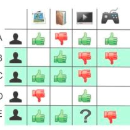Collaborative Filtering (CF) models, despite their great success, suffer from severe performance drops due to popularity distribution shifts, where these changes are ubiquitous and inevitable in real-world scenarios. Unfortunately, most leading popularity debiasing strategies, rather than tackling the vulnerability of CF models to varying popularity distributions, require prior knowledge of the test distribution to identify the degree of bias and further learn the popularity-entangled representations to mitigate the bias. Consequently, these models result in significant performance benefits in the target test set, while dramatically deviating the recommendation from users' true interests without knowing the popularity distribution in advance. In this work, we propose a novel learning framework, Invariant Collaborative Filtering (InvCF), to discover disentangled representations that faithfully reveal the latent preference and popularity semantics without making any assumption about the popularity distribution. At its core is the distillation of unbiased preference representations (i.e., user preference on item property), which are invariant to the change of popularity semantics, while filtering out the popularity feature that is unstable or outdated. Extensive experiments on five benchmark datasets and four evaluation settings (i.e., synthetic long-tail, unbiased, temporal split, and out-of-distribution evaluations) demonstrate that InvCF outperforms the state-of-the-art baselines in terms of popularity generalization ability on real recommendations. Visualization studies shed light on the advantages of InvCF for disentangled representation learning. Our codes are available at https://github.com/anzhang314/InvCF.
翻译:合作过滤(CF)模式尽管取得了巨大成功,但由于流行分布的变化,其绩效严重下降,但因流行分布变化而出现严重下降。 不幸的是,大多数流行偏差战略,而不是解决CF模式易受不同流行分布影响的问题,需要事先了解测试分布,以确定偏差程度,进一步了解受欢迎的相互纠缠的表述,以减少偏差。因此,这些模型在目标测试中产生了显著的业绩效益,同时大大地偏离了用户真实利益的建议,而没有事先了解流行分布。在这项工作中,我们提议建立一个创新学习框架,即Invariant Cooperation过滤(Invilant Commission Referation),以发现不折不扣的表达方式,忠实地展示潜在偏好和受欢迎程度,而不对流行分布做出任何假设。其核心是无偏重的偏重(即项目属性的用户偏好)展示,这与受欢迎程度的变化不相适应,同时过滤了用户的视觉形象特征,而没有事先知道受欢迎程度的分布。在5个基准基底的基底的基底的基底的基底的基底的基底的基底的基底的模型/变的模型评估中, 展示。



